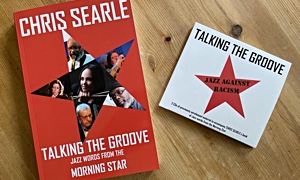Home » Jazz Articles » Book Review » Living With Jazz
Living With Jazz
We learn of his respect for our American art form through his personal experiences with musicians
 Dan Morgenstern
Dan MorgensternLiving With Jazz, A Reader
Pantheon Books
736 pages
ISBN: 037542072X
Through the eyes of a foreign-born man we learn of the author's respect for our American art form and through his personal experiences with musicians, his love and respect for creative improvisation, growth and the development of Jazz.
Like most of us who are enchanted with America's music, Dan Morgenstern first listened to Jazz on the radio and played his mother's records on a phonograph turntable. But few at age nine have been "fascinated by [a] huge black man [Fats Waller] who played the piano and sang, moved and talked with such enormous energy and good humor that it was impossible to keep still" (from Reminiscing in Tempo , 2000).
A Danish boy before and after the war in Copenhagen then during his European phase in 1946 he saw Don Redman, Don Byas, Tyree Glenn and pianist Billy Taylor. In New York in 1947 he went directly to 52nd Street, soon befriended "by a pretty girl who took him on his first visit to Harlem," he was "hanging out with no intention of becoming a jazz 'critic'," when urged by correspondent Stanley Dance to send a monthly column to the British Jazz Journal , "They can't pay," Dance explained, "but they'll send you records and books and it'll be a service to musicians."
I admit to the same enthusiasm for the first live jazz pianist I was lucky enough to hear in person at 18, the exceptionally unique stride-pianist Donald Lambert. But let me allow Dan Morgenstern to demonstrate why we share in loving Jazz.
Edited by Sheldon Meyer who arranged the contents as a synopsis of Morgenstern's's four decades of jazz history. Organized in sections beginning with eight reprinted articles about Louis Armstrong and eleven by Duke Ellington, twenty-eight "Profiles and Portraits" in-depth interviews with well-known jazz men, twenty-six "Liner Notes," sixteen "Record Reviews," sixteen "Caught in the Act" reviews from Downbeat 1964-1983, eleven "Festivals and Events", eight "Recording Jazz" 1983-2000 articles and ten titled "The Outreach of Jazz."
Morgenstern is not above criticism and when he does in print it's fully explained as in "Jazz Goes to Washington," his assessment of the First International Jazz Festival held in Washington, DC in 1962. Or in "Caught in the Act - Mary Lou Williams/Cecil Taylor" duet at Carnegie Hall-1971," which he concludes with an interesting projection, "Come to think of it, the record might work best if heard one channel at a time"!
Delightful moments abound, observed moments watching Dave Brubeck teaching Louis Armstrong his "Summer Song" or as co-producer of the Little Theatre concerts in 1964 he aptly quotes fellow writer Whitney Balliett, "A triumph.," then continues on his own enthusiasm, "And a triumph it was. From the first moment, when he [Earl Hines] invited the audience to think of themselves as guests in his 'living room,' to the final note. Hines held his listeners spellbound."
Surprisingly he cites Roy Eldridge's 1943 recorded version of "Rockin' Chair" as "one of the greatest jazz trumpet performances ever put on wax." On Miles Davis, "Daring and style, or if you prefer, guts and grace, are two essential characteristics of the extraordinary trumpeter, leader, composer and perpetual catalyst." Returning to his own personal seminal experience Morgenstern reports "Jazz and the phonograph were made for each other." And in 18 pages titled "Recorded Jazz" he describes why and how it was so from 1917 to 2000. In a monograph, "Discography: The Thankless Science," published in Downbeat in 1966 he claims "sixty years after [Goodman integrated his Quartet at Carnegie Hall]jazz continues to be a major factor...toward the realization of the American Dream"
What a wonderful read full of insight and admiration and the most authoritative of jazz truths. I'll remind readers of the same dedication Dan Morgenstern wrote in the frontispiece to his sons Adam and Josh: Keep Listening!
As Director of the Institute of Jazz Studies at Rutgers University in Newark, NJ since 1976 Morgenstern continues to witness jazz, archive jazz, influence jazz scholarship and absorb jazz in New York City at every opportunity.
Read an excerpt from Living With Jazz.
< Previous
Living With Jazz
Comments
Tags
For the Love of Jazz
 All About Jazz has been a pillar of jazz since 1995, championing it as an art form and, more importantly, supporting the musicians who create it. Our enduring commitment has made "AAJ" one of the most culturally important websites of its kind, read by hundreds of thousands of fans, musicians and industry figures every month.
All About Jazz has been a pillar of jazz since 1995, championing it as an art form and, more importantly, supporting the musicians who create it. Our enduring commitment has made "AAJ" one of the most culturally important websites of its kind, read by hundreds of thousands of fans, musicians and industry figures every month.






















